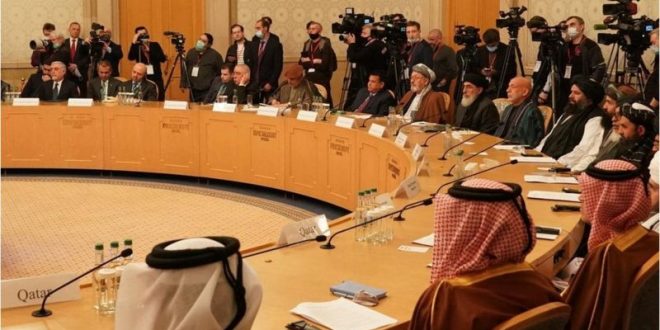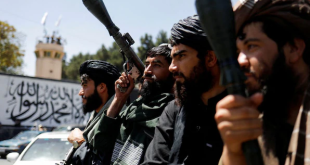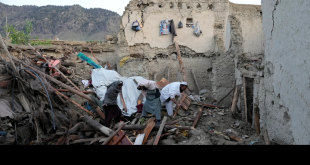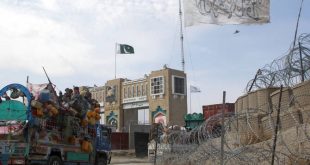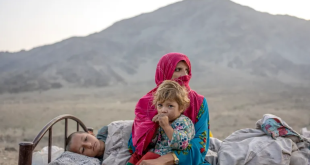Afghan-Taliban agree to accelerate peace talks
AT News
KABUL: Representatives of Russia, China, United States and Pakistan announced opposition to the restoration of the Islamic Emirate in Afghanistan and urged the Taliban not to announce their Spring Offensive.
This was revealed in a joint statement issued at the conclusion of a regular meeting of the extended “Troika”.
The extended “Troika”, comprises of representatives of Russia, China, the USA and Pakistan, focused on making progress in the intra-Afghan process to reach a negotiated settlement and permanent and comprehensive ceasefire.
The event was attended by representatives of the Afghan government, Afghanistan’s High Council for National Reconciliation, prominent Afghan political figures, and representatives of the Taliban movement. While Qatar and Turkey attended the event as guests of honor, according to the Russian Foreign Ministry.
The four states participating in the extended ‘Troika’ have agreed on a 10-point joint statement that acknowledges the widespread and sincere demand of the Afghan people for a lasting and just peace and an end to the war. The extended troika also agreed that a sustainable peace can only be achieved through a negotiated political settlement.
“We call on all parties to the conflict in Afghanistan to reduce the level of violence in the country and on the Taliban not to pursue a Spring Offensive, so as to avoid further casualties and to create an environment conducive to reaching a negotiated political settlement,” the statement said.
“As stated in the UNSC resolution 2513 (2020), we do not support the restoration of the Islamic Emirate and we call on the Government of the Islamic Republic and the High Council for National Reconciliation to engage openly with their Taliban counterparts regarding a negotiated settlement,” according to the joint statement.
The representatives of the four countries urged participants in the intra-Afghan negotiations to engage immediately in discussions on fundamental issues to resolve the conflict, including the foundations of the future peaceful and stable Afghan State, the content of a political roadmap leading to an inclusive government, and the modalities of a permanent and comprehensive ceasefire.
“At this pivotal moment, our four states call on the parties to negotiate and conclude a peace agreement that will bring an end to over four decades of war in Afghanistan,” the statement read.
They strongly advocated a durable and just political resolution that will result in the formation of an independent, sovereign, unified, peaceful, democratic and self-sufficient Afghanistan, free of terrorism and an illicit drug industry, which contributes to the creation of pull factors for the voluntary, sustainable and expeditious return of Afghan refugees, stability and global security.
They also called on all Afghans including the Government of the Islamic Republic and the Taliban to ensure that terrorist groups and individuals do not use Afghan soil to threaten the security of any other country.” We reaffirm that any peace agreement must include protections for the rights of all Afghans, including women, men, children, victims of war, and minorities, and should respond to the strong desire of all Afghans for economic, social and political development including the rule of law,” the statement said.
The four countries encouraged all concerned countries to support the Afghan people and contribute to a lasting peace in the interest of all. “We reaffirm our commitment to mobilize international political and economic support for a post political settlement in Afghanistan.”
In a statement they appreciated the long-standing support of the State of Qatar to facilitate the peace process, and supported the continuation of discussions between the parties’ negotiating teams in Doha, which began in September 2020 and which has resulted in meaningful progress toward a political settlement.
The representatives recognized and welcomed all international efforts that are underway to facilitate and support a negotiated settlement as soon as possible. They noted that the UN Secretary General Gutteres’ appointment of Mr. Jean Arnault as his personal envoy on Afghanistan and regional issues. They welcomed the UN playing a positive and constructive role on the Afghan peace and reconciliation process.
Addressing the meeting Chairman of the High Council for National Reconciliation Dr. Abdullah Abdullah made it clear that peace is not only beneficial for the people of Afghanistan, but also for the entire region and beyond. “Peace and security in Afghanistan will facilitate the realization of connectivity, and major projects,” he said. He also said the Afghan government’s negotiation team is ready to discuss any topics with the Taliban.
“We called for an end to targeted killings, and a comprehensive ceasefire to begin the next rounds of the talks in a peaceful environment,” he said.
Abdullah reiterated commitment for the peaceful settlement of the crisis in Afghanistan and called for an end to violence, and the acceleration of the peace talks. He asked the regional countries and beyond to help Afghanistan in its drive to achieve a just and lasting peace.
The Taliban leader Mullah Baradar in his speech said that the Taliban can declare a ceasefire after the Islamic system is implemented. He said Taliban are committed to the Doha agreement, adding if everything had been done in the way that was agreed upon in the Doha agreement, the internal issue of Afghanistan would have been resolved.
Baradar said durable peace would have been achieved and Afghans would have started a normal life if the Islamic system would have been established in the country.
“Intra-Afghan talks are currently underway, there is no doubt that there are some problems in this regard, but still a framework has been established, both sides have exchanged their agendas, work is in progress and progress has been made to some extent,” he said.
“The best and most effective way to solve the problem and move forward is the Doha Accord, the implementation of which can solve external problems and provide a base for solution of internal problems as well,” the Taliban leader said.
The Afghan government and the Taliban have agreed to accelerate peace talks after Russia hosted an international conference aimed at reviving a stalled peace process, the RIA news agency reported on Friday, citing a senior Afghan official.
The move comes after Russia, China, the United States and Pakistan called on Afghanistan’s warring sides to reach an immediate ceasefire.
Moreover, a Taliban negotiator Suhail Shaheen at a press conference in Moscow on Friday said that the peace negotiations in Doha should be expedited.
“It is important that the negotiations should be expedited because it will help us to achieve a permanent ceasefire and countrywide peace and this is our goal,” He said. “As we talked with Afghan politicians, they also insisted that the process should be expedited.”
Addressing a press conference aired by Russia’s Sputnik news, Shaheen said their aim is to achieve an “Islamic government” that will represent all Afghans.
But he added that “it is on Afghans which type of a government they will establish” – as a result of peace negotiations.
 Afghanistan Times
Afghanistan Times
